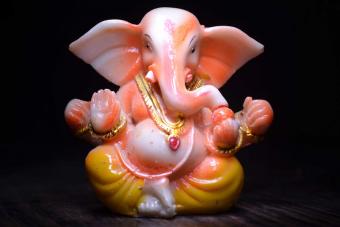
A Ganesha statue is an excellent feng shui tool for removing obstacles and attracting wealth and success. Although Lord Ganesha (also spelled Ganesh or Ganesa) is a Hindu god, many feng shui practitioners opt to step outside the traditional Chinese symbols to use this iconic Buddhist deity statue. The feng shui placement of a Genesh statue follows many of the same rules as other idol symbolism and statues, making it an easy addition to your home.
Ganesh Statue Meaning
Known as the elephant-headed god, there are many stories about Lord Ganesha's origins. Some stories place him as the natural son of Shiva and Parvati, (Hindu god and goddess.) The most popular legend is that Parvati created a boy (claiming him to be her son) to stand watch and protect her privacy while she bathed. Returning from battle, Shiva was blocked entry into his home by the boy.
Outraged, Shiva severed the boy's head from his shoulders with his sword. In an effort to appease a distraught Parvati, Shiva ordered his men to set out from the palace and take the head of the first living animal they came across that was facing north. That animal was an elephant. Shiva attached the elephant's head to the boy's body and brought him back to life. Lord Ganesha became the symbol of overcoming obstacles, and one of wisdom through the acts of listening and reflecting on issues. These gifts are believed to be shared with those displaying his statue.
Ganesh Placement at Home

You can place a Lord Ganesha idol for your home in an auspicious sector or location in your home to dissolve obstacles, offer protection, and assist in your personal and spiritual development. Using a simple bagua map, you can choose the sector or area where you'd like assistance from Lord Ganesha's assistance. Ganesha worshippers create an altar and present offerings, such as a bowl of rice. The most ideal placement is in a meditation space. However, feng shui offers a few options for using the Ganesha statue's symbolism to remove obstacles and bring prosperity. The elephant is an auspicious symbol in feng shui that trumpets success and abundance, and is why Lord Ganesha is often embraced for feng shui use.
- Always set the statue so it is facing into the room and never towards the outside of your home or facing a door or window.
- Never use more than one Ganesha statue in a room. It is considered very inauspicious to have more than one Ganesha statue.
- The statue should never have its backside to a room. This brings poverty to the house.
Ganesh Statue for Home Entrance

The story of Lord Ganesha's duty as the doorkeeper for his mother's chambers made this statue a cherished placement for the main door.
- His presence offers protection and wards off ill or bad luck attempting to enter the home.
- Place a statue above the main door to bring prosperity into the home.
- Set this statue facing into the home for inviting progress into your life.
- If you live on a dead-end street, place this statue in the foyer or main entrance area to deflect the inauspicious location of your home. The deadened road creates a poison arrow with the chi energy rushing at your home.
Ganpati Idol for Home Office

You can place a Lord Ganesha (also called Ganpati) statue in your home office to attract auspicious energy for your career. Place the statue so it isn't facing the door leading out of your office or window. This is an especially excellent location for this statue if you are facing challenges and obstacles in your career and life in general. Lord Ganesha is believed to bestow good fortune in both personal and professional endeavors. Choose one of the auspicious directions for your statue to face.
Avoid These Lord Ganesha Statue Placements
There are several places you should never place any deity statue, including Lord Ganesha. When choosing a placement location, keep in mind that this is first and foremost a religious statue, and it should be treated with this sense of respect. These include:
- Bathrooms: Avoid placing this statue in the bathroom, since this is a room with inauspicious energy generated from waste water. The statue should not face a bathroom door or wall.
- Bedroom: Deity statues are not usually placed in a bedroom.
- Garage: Never set a Ganesha statue in a garage since this is considered an inauspicious and vacant place.
- Laundry room: Don't set a Ganesha statue in a laundry room since the energy here is similar to that of a bathroom with its waste water.
- Kitchen: Never place an idol in the kitchen. This too is an area where waste water from dirty dishes, leftover or spoiled foods are disposed.
- Underneath staircase: In feng shui, the space underneath a staircase is stagnant and considered very inauspicious. The only things that should be stored here are cleaning products or similar items, but never anything of value.
- Floors: Never set the statue of Lord Ganesha on the floor or a lower placement. Give this statue a place of honor and respect. Positioning on a table or cabinet where the statue is elevated is ideal.
Using Lord Ganesha Statue in Feng Shui
Once you decide where you wish to place your Lord Ganesha statue, be sure to refer to the Vastu guidelines. The mindful placement of a Lord Ganesha statue will ensure it retains its auspicious nature, as to enhance the positive feng shui energy in your home.







